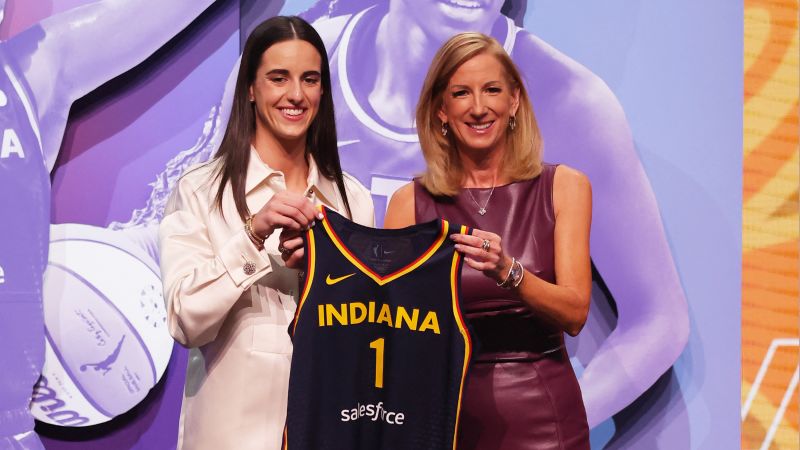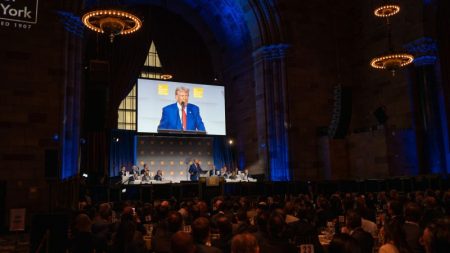Caitlin Clark, who became the leading scorer in NCAA basketball history and the first pick in the WNBA draft this week, will make a $76,535 salary this year. The top NBA pick will make $10.5 million.
Clark’s salary compared to top National Basketball Association players is drawing attention to Women’s National Basketball Association players’ pay and the often massive gender gap in professional sports salaries. The highest-paid WNBA player made a $242,000 salary, while the league minimum salary in the NBA is over a million dollars in 2023.
Clark, who dominated at the University of Iowa, as well as other college stars who have turned pro like Louisiana State University’s Angel Reese, lifted women’s college basketball to heights it’s never seen before. Clark helped attract record-breaking TV audiences and sellout crowds in arenas around the country in her final collegiate season.
But Clark is not simply the first pick in the draft. She is so popular that a ticket to her Final Four game in the NCAA tournament this year cost more than a ticket for a men’s Final Four game. The 22-year-old is the all-time scoring leader in men’s and women’s NCAA Division I history.
The WNBA’s stars aren’t asking to be paid an equal dollar amount to NBA players, however. Not right now, anyway. They acknowledge the reality of being in a league with a smaller pool of revenue to go around, and one that is a lot younger — without 50 preceding years of contract negotiations and the subsequent hard-won worker protections and salaries that come with that longevity.
What they want is more an issue of fairness, they say.
“W players want to be invested in, properly valued and fairly paid like other professionals,” Terri Jackson, head of the WNBA Players’ Association, the union representing the players, told CNN.
Women receive around 10% of the WNBA’s overall revenue, while the NBA collective bargaining agreement gives players 50% of revenue, said David Berri, a professor of economics at Southern Utah University and author of an upcoming book on women and sports.
“We are not asking to get paid what the men get paid. We’re asking to get paid the same percentage of revenue shared,” Las Vegas Aces star Kelsey Plum said in an interview in 2022.
Even the top athletes in the WNBA sometimes risk danger to play in overseas leagues — where there is no salary cap and players can make up to double or triple their US salary — in the WNBA’s off-season to supplement their income.
The star center for the Phoenix Mercury, Brittney Griner, was headed to Russia to play in the WNBA’s offseason in 2022 when she was wrongfully detained in Russia for 10 months. Griner was eventually released as part of a prisoner exchange. (The WNBA says it has been investing to ensure that players stay stateside in the off-season.)
Rookie salaries and player contracts in both the NBA and WNBA are set by their respective leagues’ collective bargaining agreements with their players’ union. The agreements include an annual salary cap for teams — $136 million in the NBA and $1.5 million for the WNBA. But the NBA has what’s known as a “soft salary cap,” in that there are several exceptions that help players bring in more money. The WNBA, in contrast, has a hard salary cap, meaning there are very few exceptions.
A WNBA spokesperson said that Clark stood to make more than $500,000 in total compensation, including cash from player marketing agreements with the league and team deals.
But Jackson said that including compensation “blurred the lines” because few players are eligible for those deals.
WNBA players have made progress on salaries since 2020, when they reached their latest collective bargaining agreement with the league. But the wide gap is a result of the economic differences between the two leagues; years of underinvestment in the WNBA; and the lack of bargaining power women traditionally have had negotiating salary, benefits and other issues like travel accommodations with the league.
“When you talk about pay equity, you are talking about resources, the level of investment, what the strategic plan is, and how intentional it is to grow [the WNBA] in a sustainable way,” Jackson said. “This is a model that has been under-resourced for so long.”
The NBA is 50 years older than the WNBA, has more than double the number of teams and games in a season, and brings in $10 billion a year in revenue, compared to a reported $200 million for the WNBA.
The WNBA has also been paid less by broadcasters and advertisers in comparison to the NBA. The NBA’s national media deals pay it $2.8 billion, while the WNBA is getting about $65 million this year for its media rights.
“It’s not an apples to apples comparison. It comes down to where this league is in its business cycle,” said Alicia Jessop, an associate professor of sport administration at Pepperdine University.
Because it’s a smaller and younger league, women’s players have had less bargaining power with team owners over their pay than men.
While NBA players receive 50% of total NBA revenue, the WNBA must hit a certain revenue threshold annually before any revenue sharing agreements kick in. This has held back women’s salaries.
“That’s a league choice. They don’t have to do it that way,” David Berri said. But the players have been stuck.
“They can’t just go off and create a new league with new teams. It takes a long time to develop attachment to professional sports teams.”
If the WNBA paid 50% of its revenue to players, top players would earn more than $3 million in salary, he said.
The WNBA launched in 1997, spearheaded by longtime former NBA commissioner David Stern, who believed creating a women’s league would grow the game overall.
But some critics say the NBA could have done more to benefit the WNBA.
“The NBA is bad at negotiating for women. The women end up being throw-ins to their deals,” said Berri.
WNBA players want to see more investment from the NBA, broadcasters and corporate partners into the league. The WNBA should not be an afterthought to the men’s league, Jackson added.
WNBA player salaries could rise in coming years as interest from fans and advertisers grows. The WNBA is coming off its most-watched regular season in 21 years, and attendance at games last season hit its highest level in 13 years.
WNBA commissioner Cathy Engelbert recently told CNN that next few years of the WNBA will set the league up for the next 30-40 years.
The league plans to expand to 16 teams by 2028. It’s negotiating new media rights that are expected to bring in millions of dollars of additional revenue and increased visibility for star players and teams. And the WNBA reportedly hopes to receive up to $100 million a season from broadcast partners in its new deals.
The players’ union is expected to opt out of its agreement at the end of the 2025 season. With a new media rights agreement and a new collective bargaining agreement, salaries could go up and benefits expand — as they did after the players opted out of the last agreement in 2018.
“If we have games that are doing 18 million viewers, all right, let’s lift things up a little bit more. Salaries will go up, benefits will go up,” Breanna Stewart of the New York Liberty and vice president of the players’ union said in a recent interview.
Read the full article here




